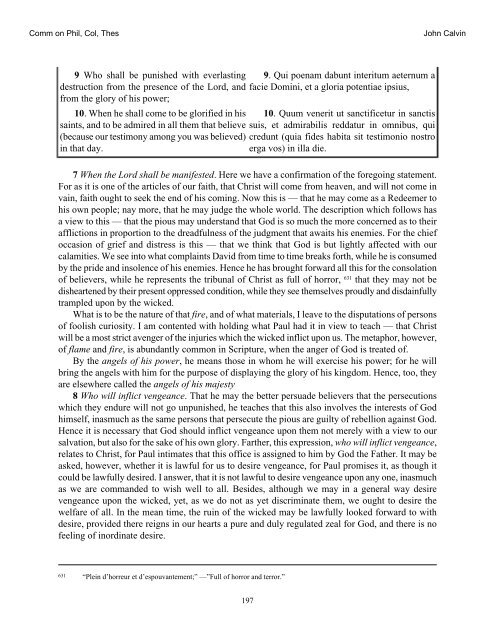Commentary on Philippians, Colossians, and Thessalonians
Commentary on Philippians, Colossians, and Thessalonians
Commentary on Philippians, Colossians, and Thessalonians
Create successful ePaper yourself
Turn your PDF publications into a flip-book with our unique Google optimized e-Paper software.
Comm <strong>on</strong> Phil, Col, Thes<br />
9 Who shall be punished with everlasting 9. Qui poenam dabunt interitum aeternum a<br />
destructi<strong>on</strong> from the presence of the Lord, <strong>and</strong> facie Domini, et a gloria potentiae ipsius,<br />
from the glory of his power;<br />
10. When he shall come to be glorified in his 10. Quum venerit ut sanctificetur in sanctis<br />
saints, <strong>and</strong> to be admired in all them that believe suis, et admirabilis reddatur in omnibus, qui<br />
(because our testim<strong>on</strong>y am<strong>on</strong>g you was believed) credunt (quia fides habita sit testim<strong>on</strong>io nostro<br />
in that day.<br />
erga vos) in illa die.<br />
7 When the Lord shall be manifested. Here we have a c<strong>on</strong>firmati<strong>on</strong> of the foregoing statement.<br />
For as it is <strong>on</strong>e of the articles of our faith, that Christ will come from heaven, <strong>and</strong> will not come in<br />
vain, faith ought to seek the end of his coming. Now this is — that he may come as a Redeemer to<br />
his own people; nay more, that he may judge the whole world. The descripti<strong>on</strong> which follows has<br />
a view to this — that the pious may underst<strong>and</strong> that God is so much the more c<strong>on</strong>cerned as to their<br />
afflicti<strong>on</strong>s in proporti<strong>on</strong> to the dreadfulness of the judgment that awaits his enemies. For the chief<br />
occasi<strong>on</strong> of grief <strong>and</strong> distress is this — that we think that God is but lightly affected with our<br />
calamities. We see into what complaints David from time to time breaks forth, while he is c<strong>on</strong>sumed<br />
by the pride <strong>and</strong> insolence of his enemies. Hence he has brought forward all this for the c<strong>on</strong>solati<strong>on</strong><br />
of believers, while he represents the tribunal of Christ as full of horror, 631 that they may not be<br />
disheartened by their present oppressed c<strong>on</strong>diti<strong>on</strong>, while they see themselves proudly <strong>and</strong> disdainfully<br />
trampled up<strong>on</strong> by the wicked.<br />
What is to be the nature of that fire, <strong>and</strong> of what materials, I leave to the disputati<strong>on</strong>s of pers<strong>on</strong>s<br />
of foolish curiosity. I am c<strong>on</strong>tented with holding what Paul had it in view to teach — that Christ<br />
will be a most strict avenger of the injuries which the wicked inflict up<strong>on</strong> us. The metaphor, however,<br />
of flame <strong>and</strong> fire, is abundantly comm<strong>on</strong> in Scripture, when the anger of God is treated of.<br />
By the angels of his power, he means those in whom he will exercise his power; for he will<br />
bring the angels with him for the purpose of displaying the glory of his kingdom. Hence, too, they<br />
are elsewhere called the angels of his majesty<br />
8 Who will inflict vengeance. That he may the better persuade believers that the persecuti<strong>on</strong>s<br />
which they endure will not go unpunished, he teaches that this also involves the interests of God<br />
himself, inasmuch as the same pers<strong>on</strong>s that persecute the pious are guilty of rebelli<strong>on</strong> against God.<br />
Hence it is necessary that God should inflict vengeance up<strong>on</strong> them not merely with a view to our<br />
salvati<strong>on</strong>, but also for the sake of his own glory. Farther, this expressi<strong>on</strong>, who will inflict vengeance,<br />
relates to Christ, for Paul intimates that this office is assigned to him by God the Father. It may be<br />
asked, however, whether it is lawful for us to desire vengeance, for Paul promises it, as though it<br />
could be lawfully desired. I answer, that it is not lawful to desire vengeance up<strong>on</strong> any <strong>on</strong>e, inasmuch<br />
as we are comm<strong>and</strong>ed to wish well to all. Besides, although we may in a general way desire<br />
vengeance up<strong>on</strong> the wicked, yet, as we do not as yet discriminate them, we ought to desire the<br />
welfare of all. In the mean time, the ruin of the wicked may be lawfully looked forward to with<br />
desire, provided there reigns in our hearts a pure <strong>and</strong> duly regulated zeal for God, <strong>and</strong> there is no<br />
feeling of inordinate desire.<br />
631 “Plein d’horreur et d’espouvantement;” —”Full of horror <strong>and</strong> terror.”<br />
197<br />
John Calvin















